Evolution of Women's Political Representation and Impact
VerifiedAdded on 2020/05/16
|7
|1700
|237
Essay
AI Summary
This essay delves into the multifaceted role of women in political representation, examining their significance in democratic systems and the challenges they face. It explores historical perspectives, contrasting the political landscape before and after women's increased participation. The essay highlights the opportunities that arise from women's leadership, including their ability to address issues specific to women and foster societal development. It also addresses the recent developments in women's political involvement, the benefits of their representation, and the potential drawbacks. Furthermore, the essay analyzes the factors affecting women's representation globally and concludes by emphasizing the evolution of gender equality in politics and the ongoing need to overcome obstacles such as gender discrimination and societal biases to achieve true equality in political leadership.
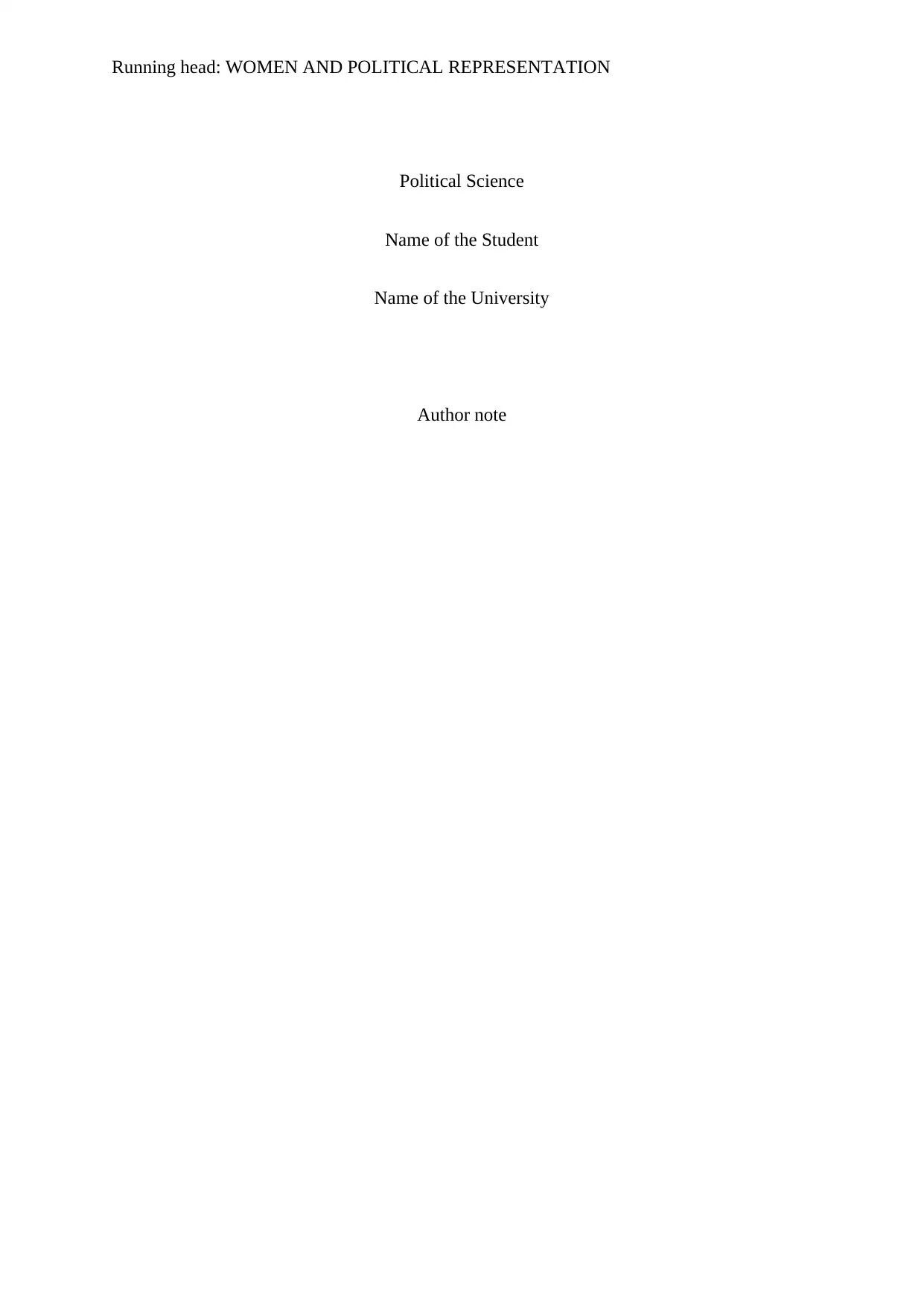
Running head: WOMEN AND POLITICAL REPRESENTATION
Political Science
Name of the Student
Name of the University
Author note
Political Science
Name of the Student
Name of the University
Author note
Paraphrase This Document
Need a fresh take? Get an instant paraphrase of this document with our AI Paraphraser
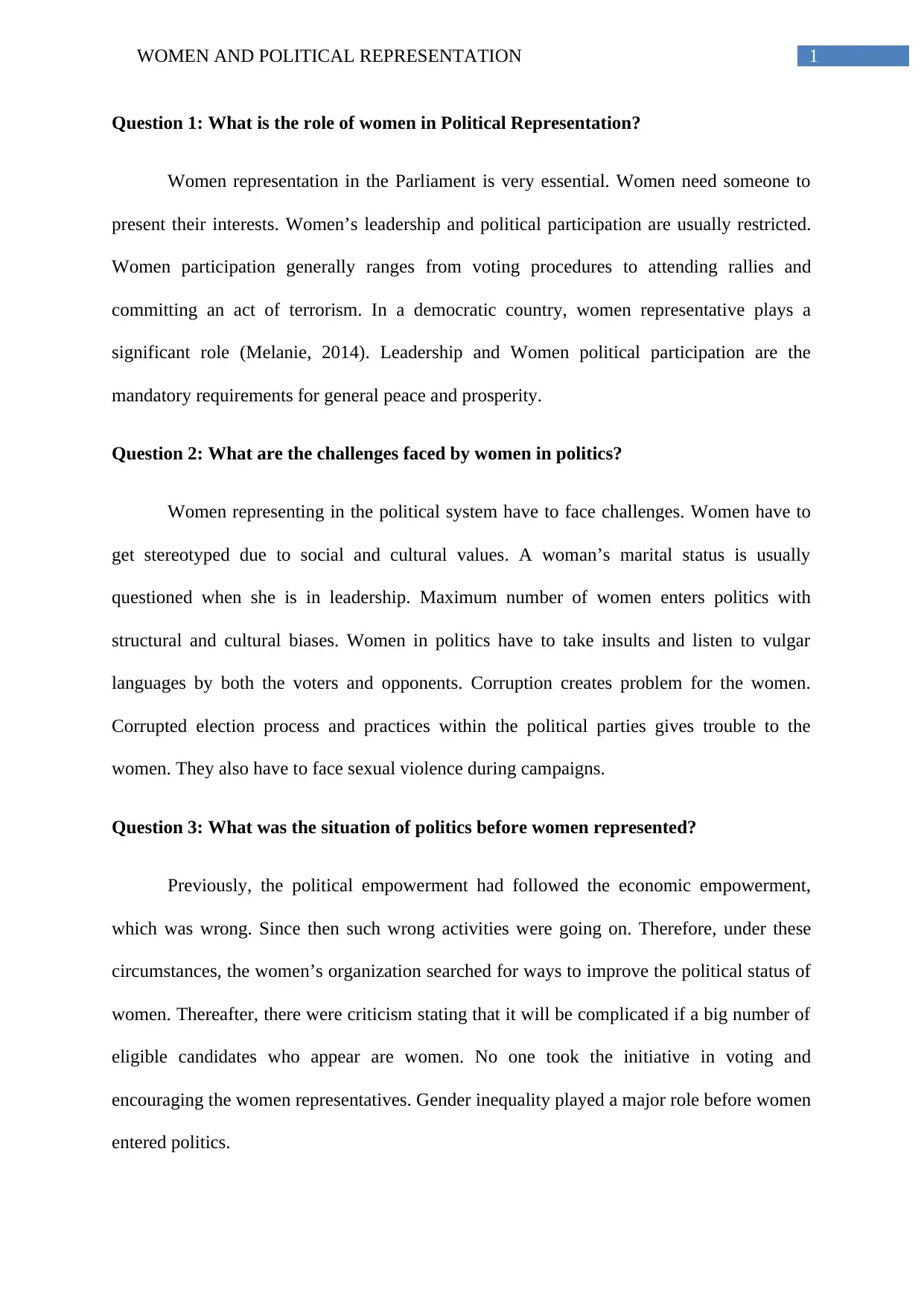
1WOMEN AND POLITICAL REPRESENTATION
Question 1: What is the role of women in Political Representation?
Women representation in the Parliament is very essential. Women need someone to
present their interests. Women’s leadership and political participation are usually restricted.
Women participation generally ranges from voting procedures to attending rallies and
committing an act of terrorism. In a democratic country, women representative plays a
significant role (Melanie, 2014). Leadership and Women political participation are the
mandatory requirements for general peace and prosperity.
Question 2: What are the challenges faced by women in politics?
Women representing in the political system have to face challenges. Women have to
get stereotyped due to social and cultural values. A woman’s marital status is usually
questioned when she is in leadership. Maximum number of women enters politics with
structural and cultural biases. Women in politics have to take insults and listen to vulgar
languages by both the voters and opponents. Corruption creates problem for the women.
Corrupted election process and practices within the political parties gives trouble to the
women. They also have to face sexual violence during campaigns.
Question 3: What was the situation of politics before women represented?
Previously, the political empowerment had followed the economic empowerment,
which was wrong. Since then such wrong activities were going on. Therefore, under these
circumstances, the women’s organization searched for ways to improve the political status of
women. Thereafter, there were criticism stating that it will be complicated if a big number of
eligible candidates who appear are women. No one took the initiative in voting and
encouraging the women representatives. Gender inequality played a major role before women
entered politics.
Question 1: What is the role of women in Political Representation?
Women representation in the Parliament is very essential. Women need someone to
present their interests. Women’s leadership and political participation are usually restricted.
Women participation generally ranges from voting procedures to attending rallies and
committing an act of terrorism. In a democratic country, women representative plays a
significant role (Melanie, 2014). Leadership and Women political participation are the
mandatory requirements for general peace and prosperity.
Question 2: What are the challenges faced by women in politics?
Women representing in the political system have to face challenges. Women have to
get stereotyped due to social and cultural values. A woman’s marital status is usually
questioned when she is in leadership. Maximum number of women enters politics with
structural and cultural biases. Women in politics have to take insults and listen to vulgar
languages by both the voters and opponents. Corruption creates problem for the women.
Corrupted election process and practices within the political parties gives trouble to the
women. They also have to face sexual violence during campaigns.
Question 3: What was the situation of politics before women represented?
Previously, the political empowerment had followed the economic empowerment,
which was wrong. Since then such wrong activities were going on. Therefore, under these
circumstances, the women’s organization searched for ways to improve the political status of
women. Thereafter, there were criticism stating that it will be complicated if a big number of
eligible candidates who appear are women. No one took the initiative in voting and
encouraging the women representatives. Gender inequality played a major role before women
entered politics.
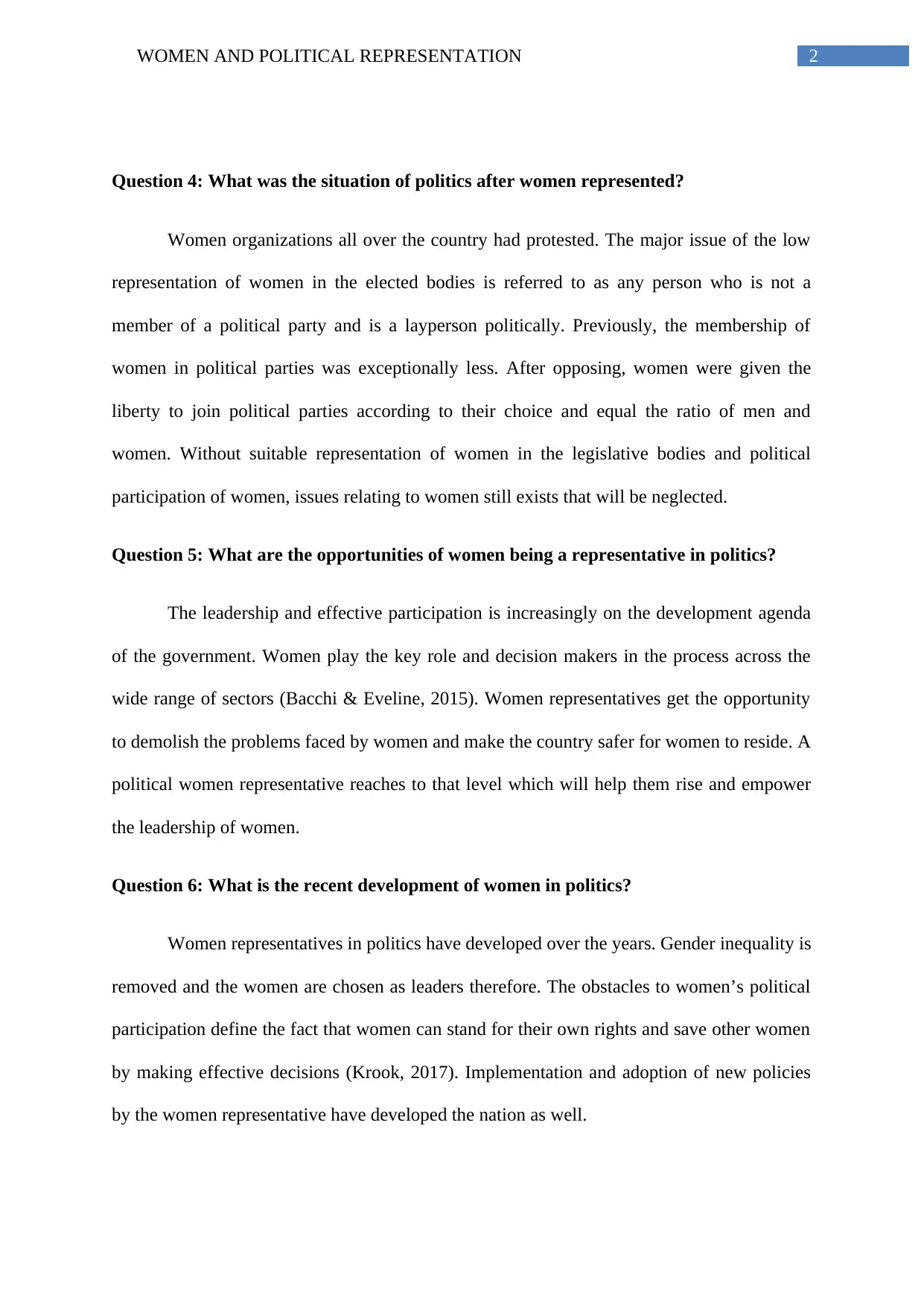
2WOMEN AND POLITICAL REPRESENTATION
Question 4: What was the situation of politics after women represented?
Women organizations all over the country had protested. The major issue of the low
representation of women in the elected bodies is referred to as any person who is not a
member of a political party and is a layperson politically. Previously, the membership of
women in political parties was exceptionally less. After opposing, women were given the
liberty to join political parties according to their choice and equal the ratio of men and
women. Without suitable representation of women in the legislative bodies and political
participation of women, issues relating to women still exists that will be neglected.
Question 5: What are the opportunities of women being a representative in politics?
The leadership and effective participation is increasingly on the development agenda
of the government. Women play the key role and decision makers in the process across the
wide range of sectors (Bacchi & Eveline, 2015). Women representatives get the opportunity
to demolish the problems faced by women and make the country safer for women to reside. A
political women representative reaches to that level which will help them rise and empower
the leadership of women.
Question 6: What is the recent development of women in politics?
Women representatives in politics have developed over the years. Gender inequality is
removed and the women are chosen as leaders therefore. The obstacles to women’s political
participation define the fact that women can stand for their own rights and save other women
by making effective decisions (Krook, 2017). Implementation and adoption of new policies
by the women representative have developed the nation as well.
Question 4: What was the situation of politics after women represented?
Women organizations all over the country had protested. The major issue of the low
representation of women in the elected bodies is referred to as any person who is not a
member of a political party and is a layperson politically. Previously, the membership of
women in political parties was exceptionally less. After opposing, women were given the
liberty to join political parties according to their choice and equal the ratio of men and
women. Without suitable representation of women in the legislative bodies and political
participation of women, issues relating to women still exists that will be neglected.
Question 5: What are the opportunities of women being a representative in politics?
The leadership and effective participation is increasingly on the development agenda
of the government. Women play the key role and decision makers in the process across the
wide range of sectors (Bacchi & Eveline, 2015). Women representatives get the opportunity
to demolish the problems faced by women and make the country safer for women to reside. A
political women representative reaches to that level which will help them rise and empower
the leadership of women.
Question 6: What is the recent development of women in politics?
Women representatives in politics have developed over the years. Gender inequality is
removed and the women are chosen as leaders therefore. The obstacles to women’s political
participation define the fact that women can stand for their own rights and save other women
by making effective decisions (Krook, 2017). Implementation and adoption of new policies
by the women representative have developed the nation as well.
⊘ This is a preview!⊘
Do you want full access?
Subscribe today to unlock all pages.

Trusted by 1+ million students worldwide
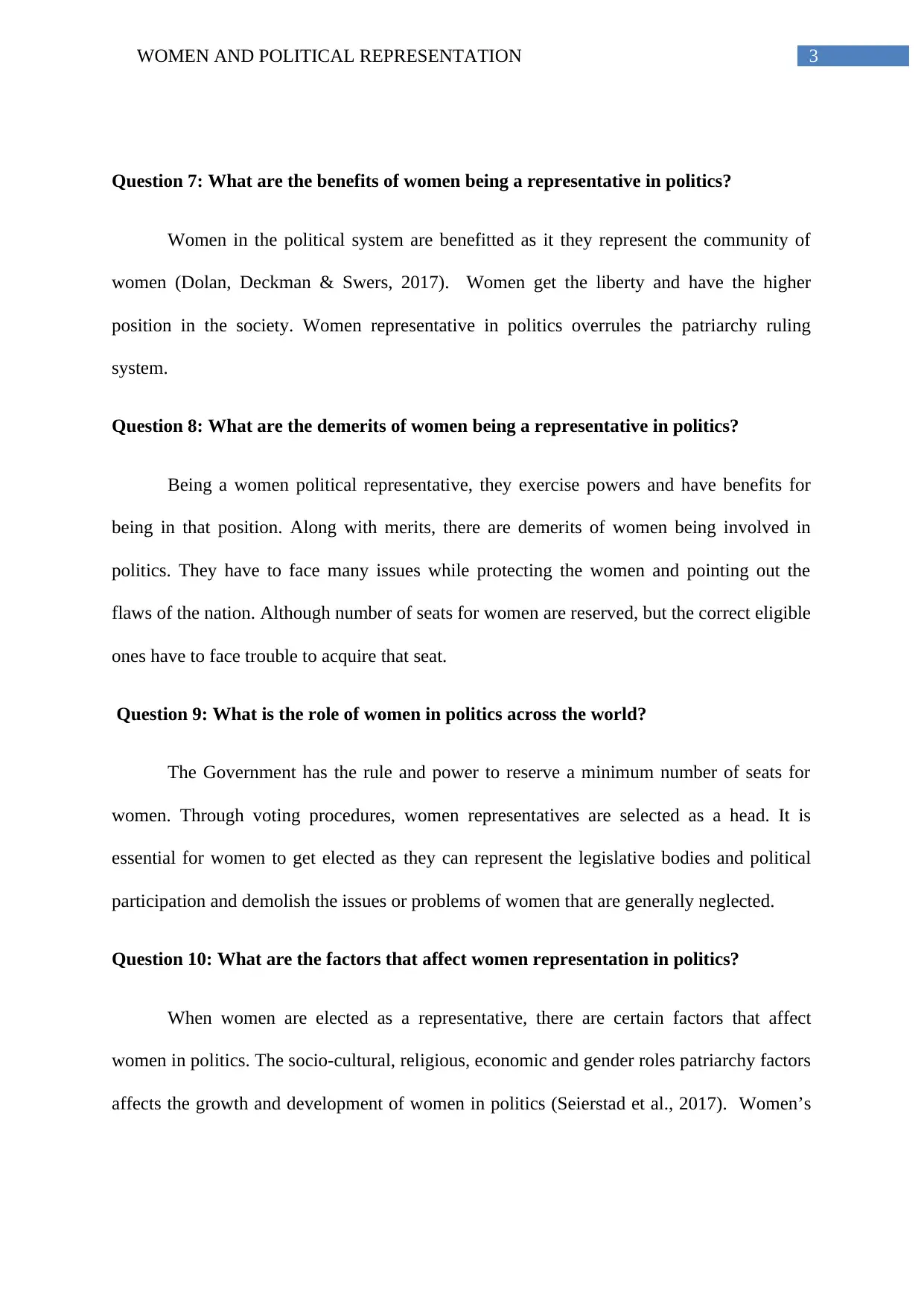
3WOMEN AND POLITICAL REPRESENTATION
Question 7: What are the benefits of women being a representative in politics?
Women in the political system are benefitted as it they represent the community of
women (Dolan, Deckman & Swers, 2017). Women get the liberty and have the higher
position in the society. Women representative in politics overrules the patriarchy ruling
system.
Question 8: What are the demerits of women being a representative in politics?
Being a women political representative, they exercise powers and have benefits for
being in that position. Along with merits, there are demerits of women being involved in
politics. They have to face many issues while protecting the women and pointing out the
flaws of the nation. Although number of seats for women are reserved, but the correct eligible
ones have to face trouble to acquire that seat.
Question 9: What is the role of women in politics across the world?
The Government has the rule and power to reserve a minimum number of seats for
women. Through voting procedures, women representatives are selected as a head. It is
essential for women to get elected as they can represent the legislative bodies and political
participation and demolish the issues or problems of women that are generally neglected.
Question 10: What are the factors that affect women representation in politics?
When women are elected as a representative, there are certain factors that affect
women in politics. The socio-cultural, religious, economic and gender roles patriarchy factors
affects the growth and development of women in politics (Seierstad et al., 2017). Women’s
Question 7: What are the benefits of women being a representative in politics?
Women in the political system are benefitted as it they represent the community of
women (Dolan, Deckman & Swers, 2017). Women get the liberty and have the higher
position in the society. Women representative in politics overrules the patriarchy ruling
system.
Question 8: What are the demerits of women being a representative in politics?
Being a women political representative, they exercise powers and have benefits for
being in that position. Along with merits, there are demerits of women being involved in
politics. They have to face many issues while protecting the women and pointing out the
flaws of the nation. Although number of seats for women are reserved, but the correct eligible
ones have to face trouble to acquire that seat.
Question 9: What is the role of women in politics across the world?
The Government has the rule and power to reserve a minimum number of seats for
women. Through voting procedures, women representatives are selected as a head. It is
essential for women to get elected as they can represent the legislative bodies and political
participation and demolish the issues or problems of women that are generally neglected.
Question 10: What are the factors that affect women representation in politics?
When women are elected as a representative, there are certain factors that affect
women in politics. The socio-cultural, religious, economic and gender roles patriarchy factors
affects the growth and development of women in politics (Seierstad et al., 2017). Women’s
Paraphrase This Document
Need a fresh take? Get an instant paraphrase of this document with our AI Paraphraser
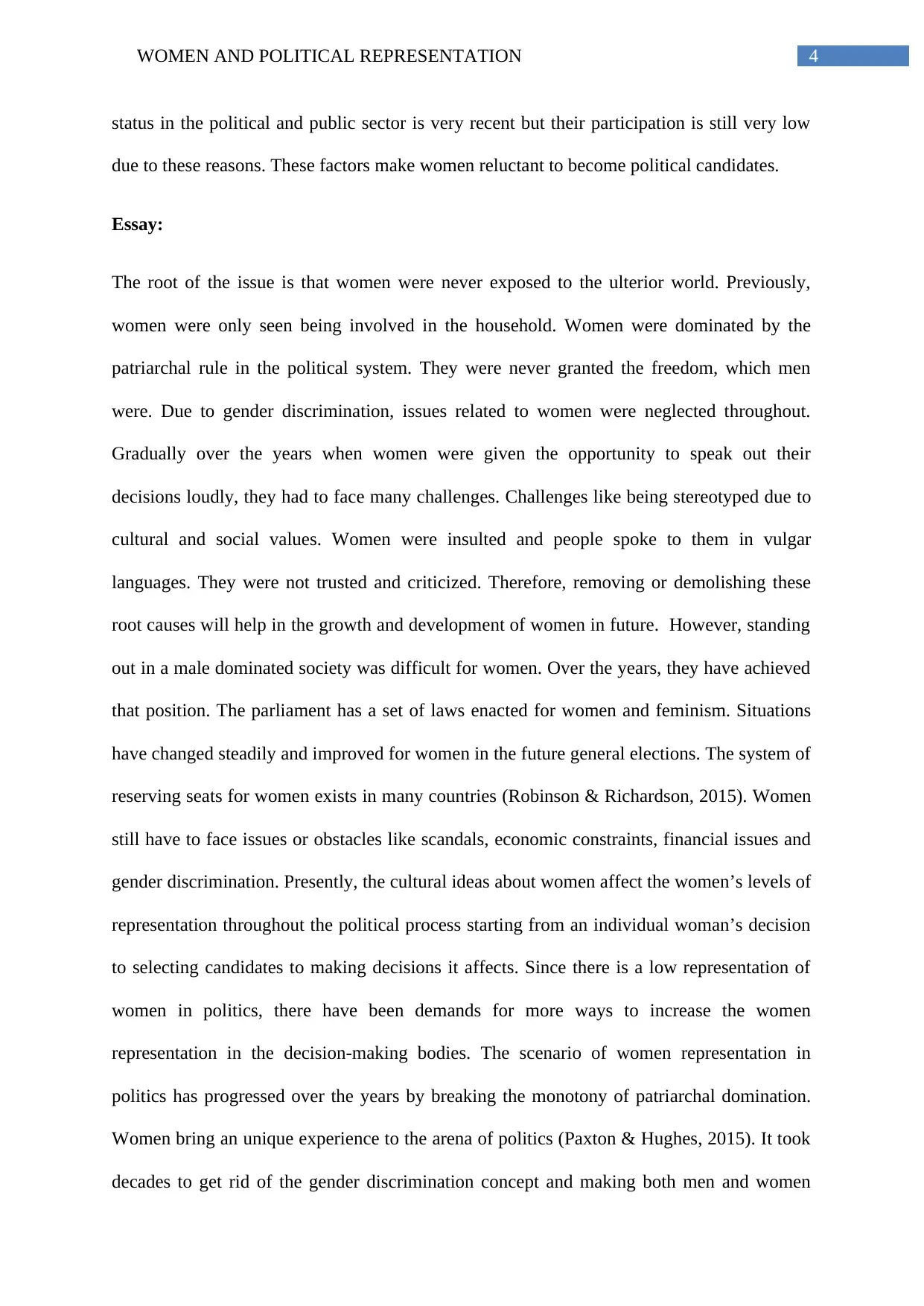
4WOMEN AND POLITICAL REPRESENTATION
status in the political and public sector is very recent but their participation is still very low
due to these reasons. These factors make women reluctant to become political candidates.
Essay:
The root of the issue is that women were never exposed to the ulterior world. Previously,
women were only seen being involved in the household. Women were dominated by the
patriarchal rule in the political system. They were never granted the freedom, which men
were. Due to gender discrimination, issues related to women were neglected throughout.
Gradually over the years when women were given the opportunity to speak out their
decisions loudly, they had to face many challenges. Challenges like being stereotyped due to
cultural and social values. Women were insulted and people spoke to them in vulgar
languages. They were not trusted and criticized. Therefore, removing or demolishing these
root causes will help in the growth and development of women in future. However, standing
out in a male dominated society was difficult for women. Over the years, they have achieved
that position. The parliament has a set of laws enacted for women and feminism. Situations
have changed steadily and improved for women in the future general elections. The system of
reserving seats for women exists in many countries (Robinson & Richardson, 2015). Women
still have to face issues or obstacles like scandals, economic constraints, financial issues and
gender discrimination. Presently, the cultural ideas about women affect the women’s levels of
representation throughout the political process starting from an individual woman’s decision
to selecting candidates to making decisions it affects. Since there is a low representation of
women in politics, there have been demands for more ways to increase the women
representation in the decision-making bodies. The scenario of women representation in
politics has progressed over the years by breaking the monotony of patriarchal domination.
Women bring an unique experience to the arena of politics (Paxton & Hughes, 2015). It took
decades to get rid of the gender discrimination concept and making both men and women
status in the political and public sector is very recent but their participation is still very low
due to these reasons. These factors make women reluctant to become political candidates.
Essay:
The root of the issue is that women were never exposed to the ulterior world. Previously,
women were only seen being involved in the household. Women were dominated by the
patriarchal rule in the political system. They were never granted the freedom, which men
were. Due to gender discrimination, issues related to women were neglected throughout.
Gradually over the years when women were given the opportunity to speak out their
decisions loudly, they had to face many challenges. Challenges like being stereotyped due to
cultural and social values. Women were insulted and people spoke to them in vulgar
languages. They were not trusted and criticized. Therefore, removing or demolishing these
root causes will help in the growth and development of women in future. However, standing
out in a male dominated society was difficult for women. Over the years, they have achieved
that position. The parliament has a set of laws enacted for women and feminism. Situations
have changed steadily and improved for women in the future general elections. The system of
reserving seats for women exists in many countries (Robinson & Richardson, 2015). Women
still have to face issues or obstacles like scandals, economic constraints, financial issues and
gender discrimination. Presently, the cultural ideas about women affect the women’s levels of
representation throughout the political process starting from an individual woman’s decision
to selecting candidates to making decisions it affects. Since there is a low representation of
women in politics, there have been demands for more ways to increase the women
representation in the decision-making bodies. The scenario of women representation in
politics has progressed over the years by breaking the monotony of patriarchal domination.
Women bring an unique experience to the arena of politics (Paxton & Hughes, 2015). It took
decades to get rid of the gender discrimination concept and making both men and women
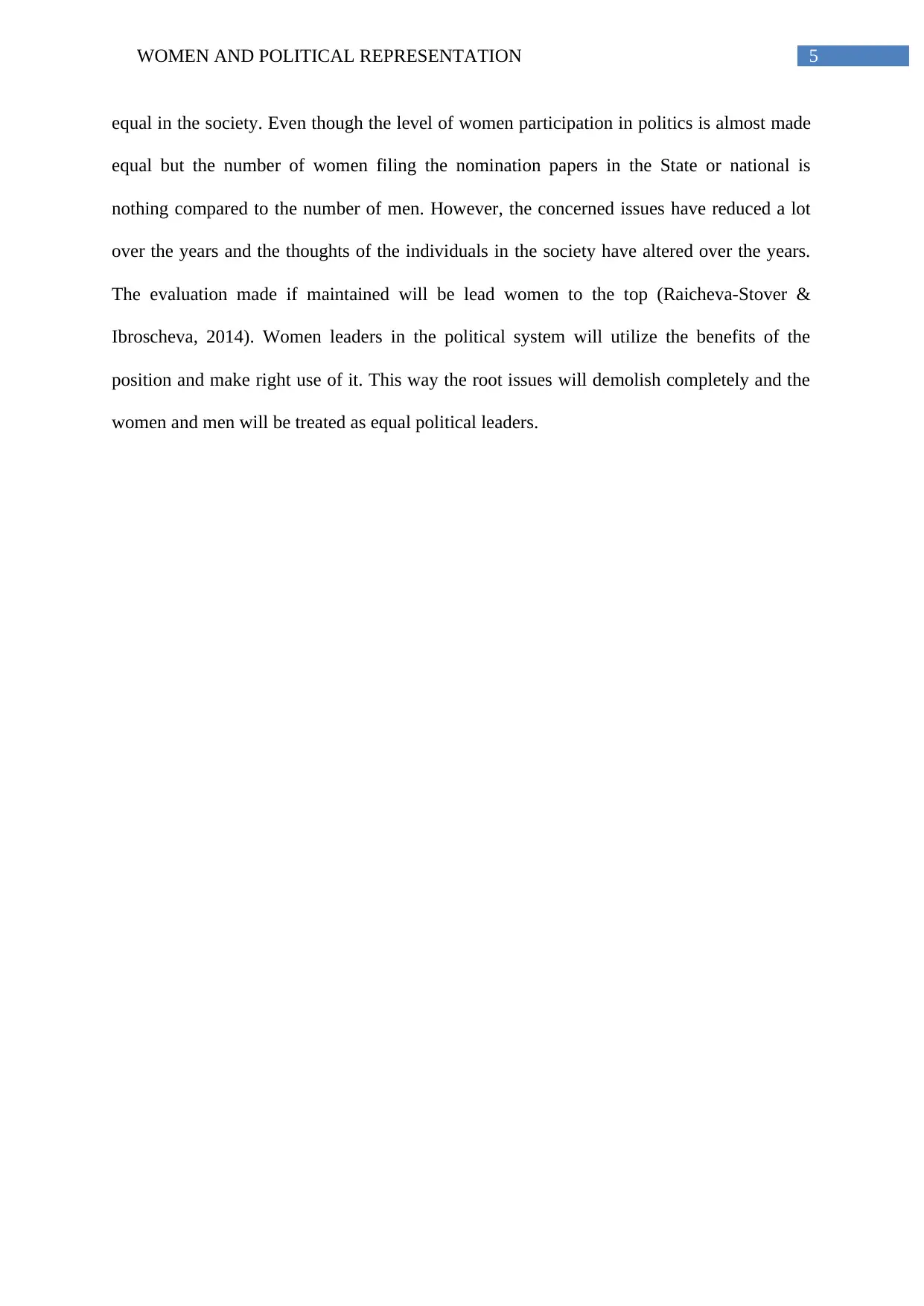
5WOMEN AND POLITICAL REPRESENTATION
equal in the society. Even though the level of women participation in politics is almost made
equal but the number of women filing the nomination papers in the State or national is
nothing compared to the number of men. However, the concerned issues have reduced a lot
over the years and the thoughts of the individuals in the society have altered over the years.
The evaluation made if maintained will be lead women to the top (Raicheva-Stover &
Ibroscheva, 2014). Women leaders in the political system will utilize the benefits of the
position and make right use of it. This way the root issues will demolish completely and the
women and men will be treated as equal political leaders.
equal in the society. Even though the level of women participation in politics is almost made
equal but the number of women filing the nomination papers in the State or national is
nothing compared to the number of men. However, the concerned issues have reduced a lot
over the years and the thoughts of the individuals in the society have altered over the years.
The evaluation made if maintained will be lead women to the top (Raicheva-Stover &
Ibroscheva, 2014). Women leaders in the political system will utilize the benefits of the
position and make right use of it. This way the root issues will demolish completely and the
women and men will be treated as equal political leaders.
⊘ This is a preview!⊘
Do you want full access?
Subscribe today to unlock all pages.

Trusted by 1+ million students worldwide
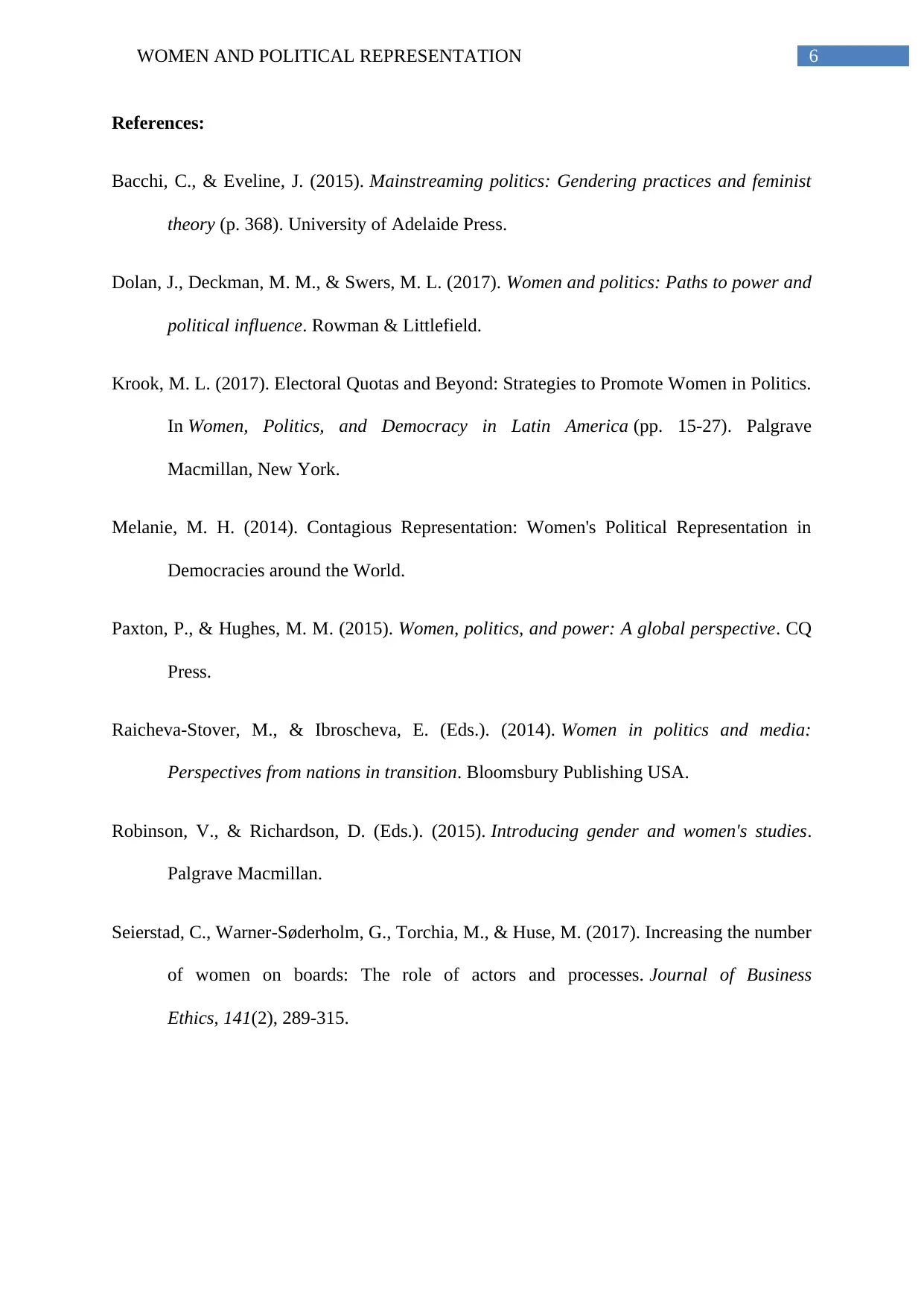
6WOMEN AND POLITICAL REPRESENTATION
References:
Bacchi, C., & Eveline, J. (2015). Mainstreaming politics: Gendering practices and feminist
theory (p. 368). University of Adelaide Press.
Dolan, J., Deckman, M. M., & Swers, M. L. (2017). Women and politics: Paths to power and
political influence. Rowman & Littlefield.
Krook, M. L. (2017). Electoral Quotas and Beyond: Strategies to Promote Women in Politics.
In Women, Politics, and Democracy in Latin America (pp. 15-27). Palgrave
Macmillan, New York.
Melanie, M. H. (2014). Contagious Representation: Women's Political Representation in
Democracies around the World.
Paxton, P., & Hughes, M. M. (2015). Women, politics, and power: A global perspective. CQ
Press.
Raicheva-Stover, M., & Ibroscheva, E. (Eds.). (2014). Women in politics and media:
Perspectives from nations in transition. Bloomsbury Publishing USA.
Robinson, V., & Richardson, D. (Eds.). (2015). Introducing gender and women's studies.
Palgrave Macmillan.
Seierstad, C., Warner-Søderholm, G., Torchia, M., & Huse, M. (2017). Increasing the number
of women on boards: The role of actors and processes. Journal of Business
Ethics, 141(2), 289-315.
References:
Bacchi, C., & Eveline, J. (2015). Mainstreaming politics: Gendering practices and feminist
theory (p. 368). University of Adelaide Press.
Dolan, J., Deckman, M. M., & Swers, M. L. (2017). Women and politics: Paths to power and
political influence. Rowman & Littlefield.
Krook, M. L. (2017). Electoral Quotas and Beyond: Strategies to Promote Women in Politics.
In Women, Politics, and Democracy in Latin America (pp. 15-27). Palgrave
Macmillan, New York.
Melanie, M. H. (2014). Contagious Representation: Women's Political Representation in
Democracies around the World.
Paxton, P., & Hughes, M. M. (2015). Women, politics, and power: A global perspective. CQ
Press.
Raicheva-Stover, M., & Ibroscheva, E. (Eds.). (2014). Women in politics and media:
Perspectives from nations in transition. Bloomsbury Publishing USA.
Robinson, V., & Richardson, D. (Eds.). (2015). Introducing gender and women's studies.
Palgrave Macmillan.
Seierstad, C., Warner-Søderholm, G., Torchia, M., & Huse, M. (2017). Increasing the number
of women on boards: The role of actors and processes. Journal of Business
Ethics, 141(2), 289-315.
1 out of 7
Related Documents
Your All-in-One AI-Powered Toolkit for Academic Success.
+13062052269
info@desklib.com
Available 24*7 on WhatsApp / Email
![[object Object]](/_next/static/media/star-bottom.7253800d.svg)
Unlock your academic potential
Copyright © 2020–2025 A2Z Services. All Rights Reserved. Developed and managed by ZUCOL.




